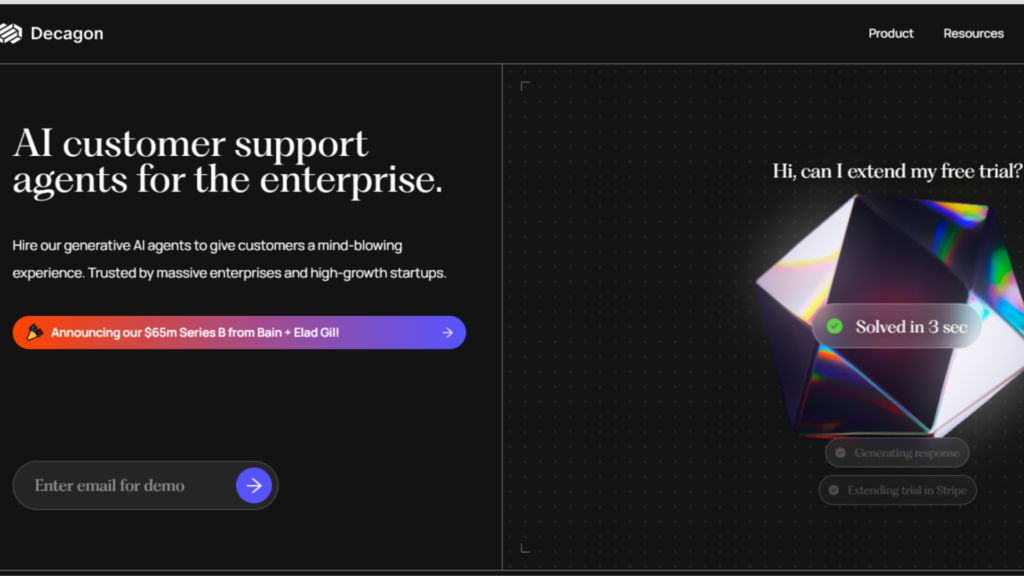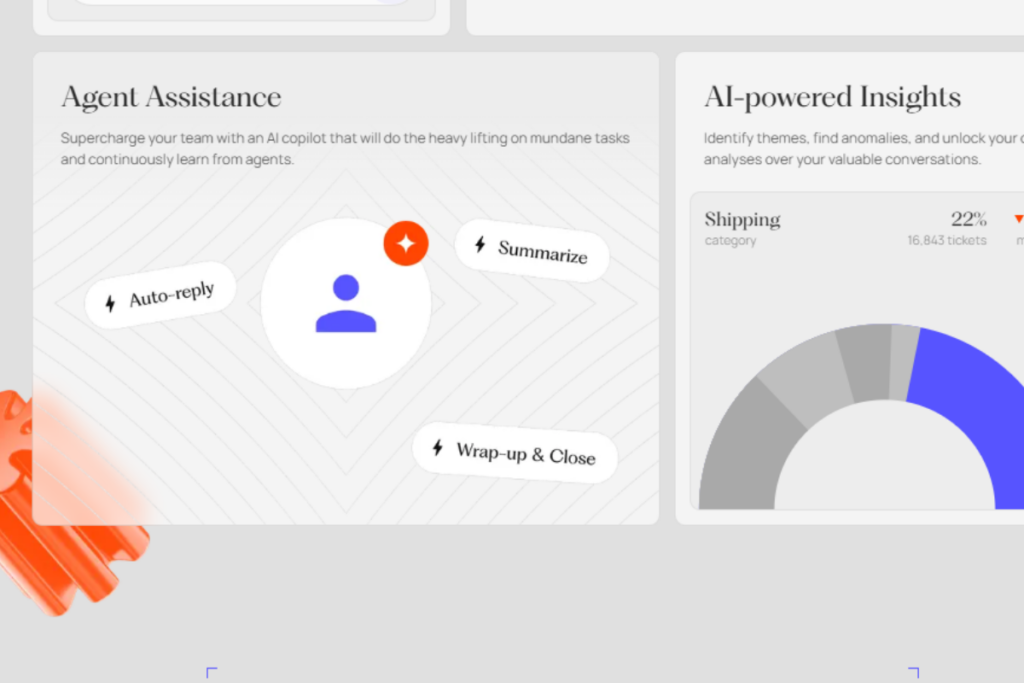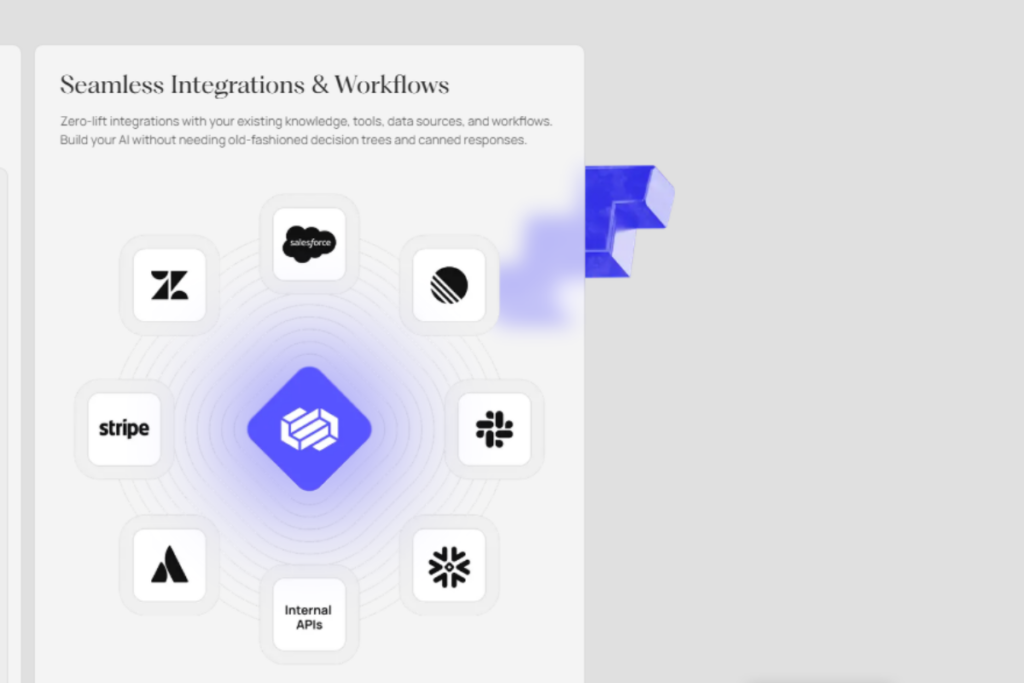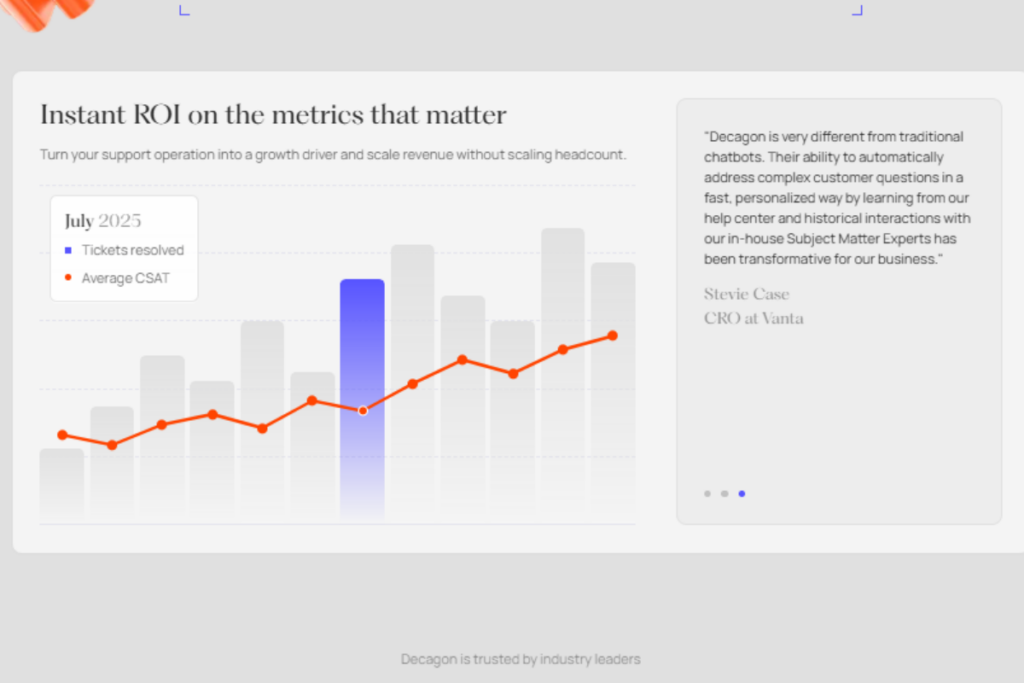Effective customer support is important for retaining customers and ensuring long-term business success. Research indicates that 93% of customers are likelier to stay loyal to brands offering exceptional service, while 62% are willing to switch after just one negative interaction.
Scaling support operations while maintaining quality remains a common challenge for businesses of all sizes. Decagon offers a solution for this. Decagon utilizes advanced generative AI to optimize customer support processes.

Its features automate repetitive tasks, handle complex queries, and seamlessly integrate with existing systems, enabling businesses to offer faster and more accurate responses. The platform addresses the increasing need for timely and personalized support.
It enhances customer satisfaction and allows human agents to focus on more strategic tasks. In this review, I will outline Decagon’s core features, explore its applications, and evaluate its impact on improving customer interactions.
Whether evaluating tools for your organization or exploring innovative solutions in customer support, this detailed overview will give the insights you need to make an informed decision about Decagon.
What is Decagon?
Decagon is an advanced generative AI platform crafted to improve how businesses handle customer support operations. It leverages artificial intelligence to manage customer inquiries by delivering accurate, fast, and contextually appropriate responses.
The platform integrates smoothly with existing support systems, helping businesses optimize processes without requiring extensive system overhauls.
Core Functionality and Purpose
Decagon focuses on automating repetitive customer service tasks while equipping teams to address more complex concerns. Its AI-powered agents analyze queries, retrieve relevant information, and provide real-time comprehensive answers.
The system adapts and refines its capabilities over time by learning from previous interactions. This helps reduce response times, minimize errors, and ensure consistent service quality across touchpoints.
Who Is Decagon Designed For?
Decagon serves businesses across various sectors, such as e-commerce, healthcare, finance, and technology. It is suitable for startups scaling operations and large enterprises managing extensive customer service needs.
Organizations with a strong focus on providing responsive and efficient customer support can benefit significantly from this tool, regardless of size or industry.
Key Benefits and Unique Features
Decagon’s ability to combine automation with a personal touch sets it apart. Key features include:
- Advanced AI Technology: Delivers natural and contextually accurate responses.
- Seamless System Compatibility: Works with existing CRM tools and customer support platforms.
- Scalability: Efficiently handles growing customer interaction volumes without proportional increases in costs.
- Self-Learning Mechanism: Continuously refine its responses through historical data analysis.
With Decagon, businesses can lower operational costs, achieve higher customer satisfaction, and free up human resources to focus on strategic priorities. The platform provides a structured, intelligent solution for organizations.
Decagon Pros and Cons
Decagon offers notable advantages for businesses aiming to enhance their customer support systems.
However, some areas may require attention for specific use cases.
Pros
- AI-Driven Responses: The platform provides accurate and natural answers to customer inquiries, helping businesses maintain high service quality.
- Scalability Across Business Sizes: It can manage increasing customer interactions, making it practical for growing startups and established enterprises.
- Ease of Integration: Decagon works well with popular customer support tools, streamlining implementation into existing workflows.
- Learning Capabilities: Over time, the system adapts and improves its performance based on historical interactions, offering better accuracy.
- Cost Savings Through Automation: Automating repetitive tasks reduces operational costs, allowing teams to focus on more strategic activities.
Cons
- Complex Setup for Some Teams: Smaller teams or those without technical expertise may face challenges during the initial configuration process.
- Limited Flexibility for Specialized Needs: Businesses with unique requirements may find the platform less customizable.
- Early Learning Phase Limitations: During the initial stages, AI-generated responses might lack depth for addressing highly intricate queries.
This overview highlights Decagon’s strengths and limitations, helping potential users weigh its capabilities against their business requirements.
Decagon Expert Opinion & Deep Dive
Decagon stands out as a strong option for businesses looking to streamline customer support operations through AI-driven automation.
Its features, including real-time responses, system compatibility, and self-improving algorithms, are well-suited for companies managing high volumes of interactions. At the same time, understanding where it excels and where it has limitations is key to determining its suitability.
Standout Features
Decagon’s ability to manage many customer queries without diminishing response quality is a significant advantage. For example, an online retail company facing thousands of questions daily about order statuses or refunds can rely on Decagon to automate these interactions.
This capability allows teams to redirect their focus to more pressing customer concerns. The platform integrates smoothly with popular CRMs and support systems, making it easier to adopt without requiring significant infrastructure changes.
Over time, its machine learning features refine responses by analyzing historical data, ensuring a more accurate and responsive system.
Potential Limitations
While Decagon handles routine inquiries effectively, it may not provide the depth required for highly complex or specialized issues. For instance, a law firm needing responses rooted in nuanced legal knowledge might find the AI-generated answers insufficient.
In such cases, manual intervention is necessary. The setup process can be challenging for smaller teams or organizations without a dedicated technical staff. While the platform becomes intuitive post-implementation, initial onboarding might require additional effort.
Ideal Users
Decagon is an excellent choice for industries such as retail, SaaS, and hospitality, where businesses regularly manage large numbers of straightforward inquiries. A mid-sized SaaS company, for example, could benefit from Decagon’s ability to handle subscription-related questions.
It allows human agents to focus on retaining customers or addressing more detailed issues. Conversely, businesses with particular needs, like healthcare providers dealing with sensitive patient data, might prioritize solutions that offer additional compliance and customization features.
Practical Applications
Consider a growing e-commerce store preparing for its holiday sales. With a spike in customer queries about shipping, product details, and returns, Decagon can manage these routine questions.
This keeps response times consistent and allows the support team to focus on resolving disputes or technical issues that require a human touch.
For a financial services company, Decagon could handle basic FAQs about account management while escalating more detailed inquiries to trained agents.
Final Observations
Decagon is a valuable tool for businesses aiming to optimize customer support, especially those handling high interaction volumes. It offers a practical solution for automating repetitive tasks, improving efficiency, and maintaining service quality.
Although it may not fully meet the needs of every organization, its strengths in scalability and accuracy make it a worthwhile option for many customer-centric industries.
Decagon Key Features
Building on its automation and efficiency strengths, Decagon offers various features that cater to businesses seeking to improve their customer support operations. Each functionality is crafted to address specific needs while maintaining simplicity in implementation.
1. AI-Powered Customer Support

Decagon’s primary function is to deliver accurate and contextually relevant responses to customer inquiries. Leveraging advanced natural language processing, it interprets customer questions and provides real-time answers.
This capability helps reduce response times while maintaining consistent service quality, even during high-volume periods.
2. Integration with Existing Tools

Decagon connects easily with popular CRM systems, helpdesk platforms, and other customer support tools. This compatibility allows businesses to integrate it into their workflows without significant disruptions. The platform enhances operations with minimal adjustment efforts by working alongside existing tools.
3. Adaptive Learning Capabilities
The platform uses machine learning to analyze past interactions and improve performance over time. This means the more it is used, the better it becomes at managing routine and complex inquiries. This feature ensures ongoing optimization and increased accuracy.
4. Scalable for Growth

Decagon can handle increasing volumes of customer queries without any performance decline. Whether serving a few dozen or thousands of customers daily, it adjusts to the workload seamlessly, making it ideal for businesses expecting growth or seasonal demand surges.
5. Language Flexibility
The platform supports numerous languages. Thus, it suits businesses catering to diverse regions or international markets. Decagon helps organizations provide localized customer support by enabling communication in various languages, improving overall satisfaction.
6. Workflow Customization Options
Decagon allows users to configure workflows to align with specific business needs. This includes routing customer tickets, prioritizing queries, and defining escalation processes. These options help businesses adapt the platform to fit their operational structure effectively.
7. Detailed Analytics and Reporting
The platform provides in-depth reporting on customer interactions and support team performance. These insights allow businesses to optimize workflows, identify trends, and make data-driven decisions to improve efficiency. This feature adds a strategic layer to customer support management.
Decagon Pricing
Decagon provides a flexible pricing model that adapts to the needs of different businesses. While the exact costs are not publicly available, pricing is determined through custom quotes based on factors like interaction volume, user seats, and required features.
A free trial allows businesses to evaluate the platform’s features and compatibility before committing financially. This trial helps users gauge how well the tool fits into their existing systems and support processes.
The platform does not offer a freemium plan, which might limit its appeal to smaller businesses or startups with restricted budgets. The costs could outweigh the immediate benefits for companies with minimal interaction volumes or those requiring extensive customization, making it less suitable for their needs.
Decagon Use Case
Decagon works best for organizations that handle large customer interactions and aim to improve efficiency through automation. E-commerce businesses, for instance, can rely on the platform to manage repetitive queries like order status, refunds, and shipping details.
The platform is equally valuable for SaaS companies managing inquiries related to subscription plans or onboarding processes. Its automation capabilities can also benefit other industries, such as travel, hospitality, and telecommunications, where timely and consistent customer service is critical.
Smaller organizations or those with highly specialized needs might find Decagon less ideal. In such cases, the scale of operations or level of customization required might not align with the platform’s strengths, making it more practical for businesses with steady or seasonal peaks in customer interactions.
Decagon’s pricing and features make it a strong fit for companies looking to streamline their support operations while efficiently managing high interaction volumes.
Decagon Support
Decagon offers an interface that simplifies customer support operations while accommodating diverse user needs. Below is a detailed look at its usability and support system.
User Interface
The platform’s interface is straightforward, with an organized layout that helps users find tools and features without confusion. Its design focuses on ease of use, making it accessible for those with varying technical expertise.
Experienced users can quickly adapt, while new users benefit from the platform’s clear structure. Customizable dashboards allow businesses to organize their workflows effectively, creating a workspace suited to their specific processes without unnecessary complexity.
Onboarding and Learning Process
Decagon provides a guided onboarding process with step-by-step instructions to help users set up the platform. These resources are sufficient for basic configurations. Users might encounter a slight learning curve for more advanced tasks, such as integrating third-party tools or customizing workflows.
Comprehensive documentation, video tutorials, and other resources are available to support the onboarding process. While these materials are helpful, smaller teams may benefit from direct assistance during the initial setup.
Customer Support Channels
Decagon offers multiple ways for users to seek help, including email, live chat, and a detailed knowledge base. The live chat feature provides immediate support for pressing issues, while email is ideal for more complex questions that require detailed responses.
The knowledge base contains articles, video guides, and FAQs covering common topics. These self-service tools help users address problems independently, reducing downtime and reliance on direct support.
Responsiveness and Dedicated Support
The support team responds promptly and effectively addresses user concerns. Decagon offers dedicated support options through specific plans for businesses requiring ongoing assistance or helps with intricate configurations.
These services include assistance with integration, workflow adjustments, and resolving technical issues. Such options are beneficial during the implementation phase, ensuring a smoother transition to the platform.
Decagon Integrations
Decagon is built to integrate with various tools and platforms, making it adaptable to different business environments. These integrations help streamline operations by connecting the platform to existing systems, reducing inefficiencies, and improving productivity.
Key Integrations
Decagon works with widely used customer relationship management (CRM) platforms such as Salesforce, HubSpot, and Zendesk. This connectivity allows businesses to maintain a centralized view of customer data, track interactions, and resolve issues efficiently.
The platform also integrates with team communication tools like Slack and Microsoft Teams, enabling real-time collaboration among team members. Decagon provides API support for businesses with unique needs, allowing integration with specialized or proprietary software to meet specific workflow requirements.
Improving Workflows
Integrations with CRMs and communication tools simplify processes by reducing repetitive tasks and automating ticket management.
For instance, linking Decagon with a CRM ensures customer inquiries are automatically logged and assigned to the appropriate team member, minimizing manual input and potential errors. Communication tool integration ensures seamless coordination, helping teams resolve issues faster and more accurately.
Device and System Compatibility
Decagon is accessible across various devices and operating systems, including Windows, macOS, and Linux. Its cloud-based nature means users can manage it through major web browsers, making it highly accessible for teams working in different locations or hybrid setups.
The platform also supports mobile devices, offering a responsive design that allows support agents to work efficiently on smartphones and tablets. This flexibility ensures consistent performance, regardless of the device being used.
Decagon FAQ
1. How does Decagon’s pricing work?
Decagon operates on a custom-quote pricing model determined by the number of interactions and features required. Businesses can evaluate the platform with a free trial.
2. What integrations does Decagon support?
Decagon connects with tools like Salesforce, HubSpot, Zendesk, Slack, and Microsoft Teams. It also supports API integrations for businesses needing custom connections.
3. What are the main features of Decagon?
Decagon offers AI-powered customer support, self-learning capabilities, workflow automation, analytics, language flexibility, and seamless integration with other business tools.
4. What support options are available for Decagon users?
Decagon provides support via email, live chat, and a comprehensive knowledge base with tutorials and FAQs. Users on certain plans can access dedicated assistance for more complex needs.
5. Is Decagon suitable for smaller businesses?
Decagon best suits mid-sized to large organizations with high customer interaction volumes. For smaller businesses, the cost may only be viable if they handle significant inquiry levels.
6. Can Decagon be used on mobile devices?
Yes, Decagon offers a mobile-friendly interface that allows users to efficiently manage customer support tasks on smartphones and tablets.
Decagon Alternatives
The table below outlines how Decagon compares with its direct competitors based on features, pricing, and best-fit scenarios.
| Tool | Key Features | Pricing | Best Fit |
|---|---|---|---|
| Decagon | AI-driven customer support, self-learning algorithms, workflow automation, multi-language support, and CRM integrations like Salesforce and HubSpot. | Custom pricing; free trial available. | Mid-sized to large businesses managing high volumes of customer interactions. |
| Cognigy | Conversational AI, no-code bot builder, and support for multiple communication channels. | Custom enterprise pricing; no free trial. | Organizations needing automation across various communication channels. |
| Parloa | Specialized in voice-based conversational AI with integration options. | Custom pricing; details available on request. | Businesses focused on voice-driven customer service. |
| Agentforce | Workflow-focused automation with advanced customer support features. | Subscription-based pricing; free trial available. | Teams prioritizing workflow optimization in customer support. |
| Einstein Service Agent (Salesforce) | Integrated AI for Salesforce users, predictive analytics, and automation features. | Pricing aligned with Salesforce enterprise plans. | Businesses already using Salesforce for customer relationship management. |
| KapaAI | Chatbots, analytics, and multi-channel customer interaction tools. | Custom pricing; free trial available. | Smaller organizations focusing on chatbot-driven interactions. |
| Sierra AI | Automation features, language support, and workflow customization. | Tiered pricing plans designed for smaller budgets. | Small businesses looking for affordable automation solutions. |
| Siena AI | Conversational AI with sentiment analysis and advanced chatbot functionality. | Subscription-based pricing; free tier offered. | Businesses that value sentiment-aware AI for customer interactions. |
| Outverse | AI-powered workflow automation and CRM integration for customer-focused operations. | Custom pricing based on usage. | Large enterprises seeking to unify workflows and customer service automation. |
Decagon provides scalable automation with a strong focus on multi-language support and AI-powered customer service. Competitors like Cognigy excel in multi-channel automation, while Parloa specializes in voice-based interactions.
Einstein Service Agent is a natural fit for Salesforce users, and tools like Sierra AI and KapaAI cater to smaller businesses with budget-friendly options. Siena AI offers sentiment-aware functionality, while Outverse is best suited for enterprises requiring broader workflow management.
You can go for the right tool according to your particular business needs and available resources.
Summary of Decagon
Decagon, founded in 2023 by Jesse Zhang and Ashwin Sreenivas, is based in San Francisco, California. The company specializes in AI-powered customer support solutions that automate enterprise-level customer service operations.
However, Decagon has secured $100 million in funding through three rounds. Its seed round was led by Andreessen Horowitz, followed by a Series A led by Accel, and a Series B spearheaded by Bain Capital Ventures. This growth highlights its strong presence in the AI-driven customer service industry.
Decagon’s solutions are trusted by companies such as Notion, Bilt, Rippling, Substack, Duolingo, Eventbrite, and Curology. These businesses rely on Decagon to streamline customer interactions and optimize operational efficiency.
With its rapid expansion and adoption by major enterprises, Decagon has become a leading player in transforming customer support through AI.
Conclusion
Decagon offers a valuable solution for businesses seeking to improve customer support through AI-powered automation. Its strengths include scalable operations, adaptive learning capabilities, multi-language functionality, and seamless integration with popular tools like Salesforce and HubSpot.
These features make it highly suitable for mid-sized to large organizations managing substantial customer interactions. Smaller businesses or those with unique needs may find its pricing or customization less aligned with their goals.
We recommend Decagon to companies aiming to streamline customer service and boost efficiency. Exploring its free trial can provide insight into how the platform aligns with specific business requirements.
We encourage you to share your experiences with Decagon or similar tools. If you’re evaluating ways to elevate customer support, consider this platform a potential fit. Your feedback and insights can contribute to better decisions and improved outcomes in leveraging AI-driven solutions.